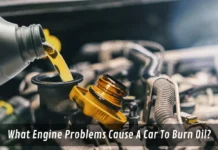Engine oil plays a crucial role in keeping your vehicle’s engine running smoothly. It lubricates moving parts, reduces friction, helps regulate temperature, and prevents harmful deposits from building up. However, using the wrong engine oil can cause wrong engine oil damage, leading to serious and unexpected consequences that affect your car’s performance, efficiency, and longevity. Many drivers underestimate the importance of choosing the right oil, assuming that all motor oils are interchangeable. The truth is that every engine is designed with specific oil requirements, including viscosity, additives, and synthetic or conventional formulations.
How Does Motor Oil Work in Your Car?

Before we get to the scary stuff, let’s break down why motor oil is a big deal. It’s not just there to fill space it’s working overtime to keep your engine alive. Here’s the rundown:
- Lubrication: Keeps metal parts from grinding like a bad dance move.
- Cooling: Sucks up heat so your engine doesn’t turn into a furnace.
- Cleaning: Scoops up dirt and tiny metal scraps floating around.
- Sealing: Fills gaps to boost efficiency and power.
- Protection: Fights off rust and corrosion like a shield.
When you use the wrong oil, these jobs go haywire, and your engine feels the burn literally. Let’s see what happens next and how wrong engine oil damage can put your car at risk.
What Happens When You Use the Wrong Oil for Your Car?
01. Reduced Engine Performance
The wrong oil could be dragging it down. If the viscosity’s off—too thick or too thin—lubrication takes a hit. Thick oil moves like sludge, slowing everything down, while thin oil can’t keep up with the friction. You’ll notice sluggish acceleration, weaker power, and a shaky idle—like your car’s throwing a tantrum. It’s your engine’s way of saying, Help, I’m struggling! Left unchecked, this can snowball into bigger damage.
02. Increased Engine Wear and Tear

This one’s a silent killer. Oil builds a protective film between moving parts—think pistons, crankshafts, and cams. Use the wrong stuff, and that film’s either too flimsy or too sticky. Too thin, and metal scrapes metal; too thick, and it can’t reach tight spots. Either way, wear ramps up fast—think louder knocks, hotter temps, and parts breaking down years early. I’ve seen engines trashed because someone grabbed the wrong jug off the shelf. Don’t let your ride age before its time.
03. Poor Fuel Economy
Gas prices sting enough without this curveball. The wrong oil makes your engine work harder—thick oil adds resistance, thin oil fails to cushion. Studies say you could lose 1-3% of your fuel efficiency, which sounds tiny until you’re filling up twice as often. That’s extra cash down the drain instead of in your coffee fund! For instance, if your car calls for a slick 0W-20 synthetic and you dump in a chunky 20W-50, you’re basically choking its efficiency. Match the spec, and keep those miles per gallon humming.
04. Overheating Issues
Your engine’s a heat beast, and oil’s the cooling MVP unless it’s the wrong kind. If it can’t flow right or handle the heat, you’re in for trouble. Thick oil clogs up, thin oil burns off, and suddenly your engine’s cooking. Think warped parts, cracked gaskets, or a full meltdown on the highway. I’ve watched cars steam up in traffic jams all because the oil couldn’t take the heat. In summer or heavy towing, this risk skyrockets. Get the right grade, and keep your cool!
05. Increased Emissions and Environmental Impact
Going green? The wrong oil can mess that up. It throws off combustion, pumping out more smoke and gunk. Too-thick oil clogs the system; too-thin oil lets deposits build up, choking your catalytic converter. You might see black exhaust or flunk an emissions test—plus, it’s rough on the planet. Modern engines need precise oil to hit eco-standards, and a mismatch can undo all that. Stick to the recommended type, and you’ll keep your car—and the air—cleaner.
06. Sludge Buildup
This one’s straight-up grim. Cheap or mismatched oil breaks down into a thick, tarry sludge that gums up your engine. It’s like syrup clogging a straw—oil can’t flow, parts starve, and damage creeps in. I’ve heard mechanics curse over engines so sludged they had to chisel it out. It’s worse in stop-and-go driving or extreme temps. Quality oil matched to your car’s needs stops this gooey nightmare—don’t let sludge turn your engine into a swamp!
07. Warranty Risks
Here’s a gut punch: the wrong oil could void your warranty. Manufacturers set strict oil specs, and if you stray like using 15W-40 when 5W-30’s the rule they can refuse repairs. Imagine an engine failure, and the dealer says, No, you’re on your own. That’s thousands out of pocket for a fix that should’ve been covered. Keep receipts, follow the manual, and save yourself the heartache. Who knew oil could mess with your safety net?
To avoid costly mistakes, check out these warning signs that your car needs an oil change.
How to Identify If You’ve Used the Wrong Oil

Oops, used the wrong oil? Watch for these red flags:
- Ticking or knocking sounds under the hood
- Fuel mileage dropping fast
- Overheating alerts or steam
- Oil puddles under your car
- Check Engine Light popping on
- Laggy performance or rough idle
- Smoky exhaust fumes
For official recommendations on engine oil specifications, check your vehicle’s manual or visit API Engine Oil Guide.
What Should You Do If You Used the Wrong Oil?
Caught the mistake? Here’s your fix-it plan:
- Check the Manual: Find the right oil
- Drain It Out: Dump the wrong oil pronto no delays!
- Swap the Filter: New filter keeps old junk from mixing in.
- Refill Smart: Pour in the manufacturer’s pick.
- Run a Test: Start the engine, let it circulate, and listen.
- Call a Pro: If trouble sticks, get a mechanic’s eyes on it.
Fast moves can save your engine from a meltdown!
Recommended Oil Types for Different Conditions
| Cold Climate | Low-viscosity (0W-20, 5W-30) |
| Hot Climate | High-viscosity (10W-40, 20W-50) |
| High Performance | Fully synthetic |
| Older Vehicles | Conventional or high-mileage |
| Heavy Loads/Towing | Synthetic blend or 15W-40 |
Conclusion
Choosing the right engine oil is not just about maintenance it’s essential for your vehicle’s performance, efficiency, and longevity. The wrong oil can lead to engine wear, overheating, poor fuel economy, increased emissions, and even long-term mechanical damage. Many drivers overlook the importance of using the correct oil, but modern engines are highly sensitive to viscosity, additives, and formulation differences. Manufacturers recommend specific oil types for a reason they are engineered to match the precise needs of your vehicle. Ignoring these guidelines may not show immediate effects, but over time, wrong engine oil damage can lead to costly repairs and reduced engine lifespan.







